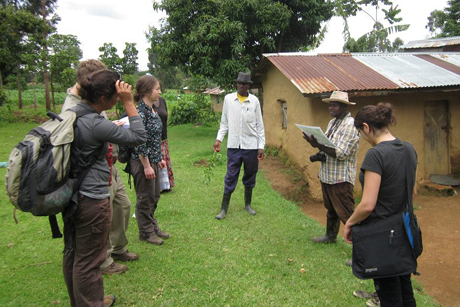Food, poverty research are focus of Sept. 17 event
By Krishna Ramanujan

A doctoral student in the field of civil and environmental engineering has taken an interdisciplinary approach to study at what stage water-borne pathogens contaminate household drinking water in Ethiopia.
And a graduate student in the field of soil and crop science has studied the effectiveness of the soil amendment biochar – a charcoal byproduct produced by burning biomass at slow, low heat – by exploring biomass availability, energy production, emissions from creating the charcoal and its effect on soil fertility and economics in small farming systems in Kenya.
A symposium will showcase such research results from the National Science Foundation-supported (NSF) Food Systems and Poverty Reduction Integrative Graduate Education and Research Training (IGERT) program Sept. 17, 1:30 to 7 p.m. at the Statler Hotel. The public event will include TED-style talks aimed at a general audience by the graduate student researchers, a poster session and reception.
The IGERT program, administered through the Cornell Institute for Food, Agriculture and Development, was funded by a five-year, $3.2 million NSF grant awarded in 2009. Since then, the program has trained three cohorts of 27 Ph.D. students to use interdisciplinary approaches to food systems and agriculture issues that contribute to extreme poverty.
“We recruited some exceptional graduate students to Cornell who would not have come here without the IGERT program,” said program principal investigator Chris Barrett, the Steven B. and Janice G. Ashley Professor of Applied Economics and Management.
“We have enabled students who were doing first-rate discipline-focused research to talk across disciplines,” Barrett added. For example, the program has trained students in plant sciences to talk shop with economists and animal scientists, and economics students to understand intricacies of soil science.
The students took a three-semester sequence of courses, with a yearlong seminar on professional skills and research proposal development. Students engaged in group field projects in the first summer in Ethiopia and Kenya, and later returned to the field for a semester to conduct dissertation research.
While doing group summer projects, students work professionally with a client to answer practical questions with scientifically defensible answers. “These experiences are transformative,” said Barrett. The students “are in the deep end of the pool, and they found it really affected how they think about research in a developing country.”
The students also must apply their academic learning to real-world problems and relate to nonacademic clients, which taps into Cornell’s land-grant mission to transfer knowledge to practical settings, Barrett added. Program alumni are positioned to work effectively across disciplines on complex issues that require interdisciplinary solutions, Barrett said.
Still, the program’s biggest challenge was “creating and maintaining a platform for interdisciplinary instruction,” said Barrett. In general, graduate education is discipline-oriented, making it hard to allocate faculty time for special programs.
The Sept. 17 presentations will include analyses of index-based livestock insurance in northern Kenya that has the potential to help pastoralists protect their herds from droughts and other natural disasters, and a case study from northern Ethiopia that uses interdisciplinary research to understand the significance of plant diversity for farming families as they respond to dramatic social and ecological changes.
Media Contact
Get Cornell news delivered right to your inbox.
Subscribe